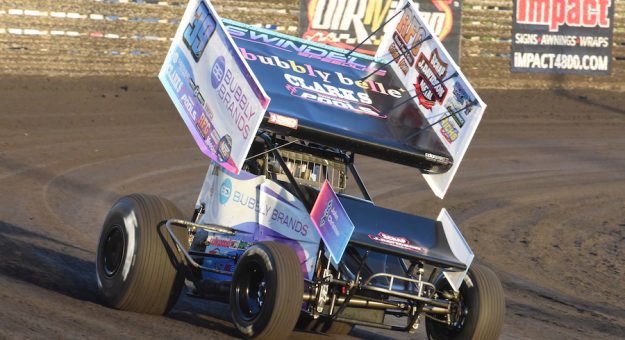The mid-summer Howard Kaeding Classic turned out to be a six-doughnut night for Justin Sanders.
His sprint car whirled like a mini tornado in celebratory loops across turn two, one after the other after the other, as if it never wanted to stop. With each loop, the emotions built like steam in a hot teakettle, waiting to vent all the frustration that hounded Sanders during the first half of the season.
This was his second win in what is considered a signature event for 410 sprint cars in northern California. And Ocean Speedway, a tight quarter-mile bullring on the Santa Cruz County Fairgrounds, is familiar territory where Sanders has won a championship and cut his racing teeth just minutes from his home in the coastal city of Aromas.
The HKC win was Sanders’ seventh of the year to that point. It was a midseason tally with which most drivers would have been more than happy. But for Sanders, the results simply hadn’t measured up to 2021, what many consider his breakout year.
He won 21 races that season, making him the second-biggest winner on the West Coast, behind Dominic Scelzi, who had the best year of his career.
But Sanders was still hungry.
“It’s been such a long time since I got a big win,” he said as he soaked in the Howard Kaeding Classic victory. “I just needed a break and I just let loose on those doughnuts.”
The frustration he unleashed in those doughnuts had been building inside a guy who doesn’t want just to win races – after all, he has about 125 of those over his career – he wants wins in big races.
A few weeks before the HKC, Sanders saw a potential win at Skagit’s Dirt Cup slip away.
“I was running fourth when a lapped car screwed up my night and I finished second,” he recalled. “I just wanted to win a big race.”
But less than half an hour after Sanders declared himself pumped up and speechless over a “big race” win, his typical post-race routine set in. Pictures had been taken. A few fans got autographed hero cards. The trophy was packed away. The trailer was yet to be loaded, but Sanders’ mind was already thinking about Sunday morning. Relaxing to savor a win on Saturday night was not in the cards.
“I don’t do relaxed,” Sanders contended, “and I won’t be relaxed tomorrow morning. It’s just a day to get ready for the next race.”
It’s a confession of sorts, that reveals the core of who Sanders is. Somewhat aloof and focused at the track, Sanders is no social butterfly and is not one for small talk, but he brings an intensity that can bore tunnels through mountains. In late summer, he chased off a race official who was trying unsuccessfully to get Sanders to the front straightway for a frisbee toss to the fans.
“I don’t have time for that,” he growled, as was grooving a tire. “I’m trying to figure out how to move up from sixth spot in the dash.”
There’s a time and place for fans and the show biz of racing, but not when there’s work to be done.
Like all drivers, Sanders brings his helmet bag to the track. But he also brings his toolbox and a lunch bucket. In other words, he’s a working man’s racer.
After winning almost all there was to win in karts and micros, Sanders declared he wanted to race sprint cars, even though he was only 15 years old. Besides his youth, there was one other problem. He didn’t have a sprint car. His racing cupboard was bare.
“I said, ‘OK, but, you’re gonna have to give me a year to get everything together,’” recalled his dad, Rick Sanders, a former Ocean Speedway champion who had left the sport years before. The pair began building a car, piece by piece. The budget was tight and so was space.
Even after getting a car on four wheels, there wasn’t much room for error.
“It was all he had and if he wrecked it, we couldn’t replace it,” his dad explained. “It wasn’t all peaches and cream in the beginning. He’s a hard-working guy but it was hard to race against guys who had a lot more than he had. It took Justin years just to get his trailer.”
Tight budgets and lack of equipment forced Sanders’ career to begin like an albatross trying to fly. It was a slow start and needed lots of runway. In 2011, Sanders ran a mere 14 races. Not many by most standards, but it matched the number of races he ran combined for the six years prior. Sanders ran only two or three dozen races a year until 2020, including 31 races the year he won the 360 sprint car track championships at Ocean Speedway and Marysville Raceway Park.
